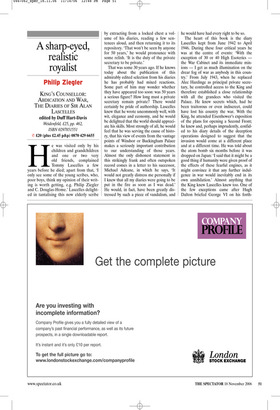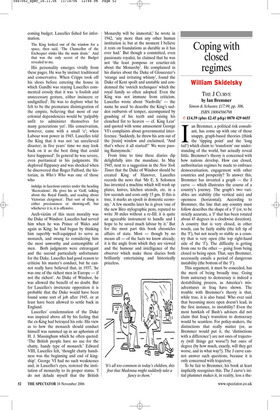A sharp-eyed, realistic royalist
Philip Ziegler
KING’S COUNSELLOR: ABDICATION AND WAR, THE DIARIES OF SIR ALAN LASCELLES edited by Duff Hart-Davis Weidenfeld, £25, pp. 462, ISBN 0297851551 ✆ £20 (plus £2.45 p&p) 0870 429 6655 He was visited only by his children and grandchildren and one or two very old friends, complained Tommy Lascelles a few years before he died; apart from that, ‘I only see some of the young scribes, who, poor boys, think my opinion of their writing is worth getting, e.g. Philip Ziegler and C. Douglas-Home.’ Lascelles delighted in tantalising this now elderly scribe by extracting from a locked chest a volume of his diaries, reading a few sentences aloud, and then returning it to its repository. ‘That won’t be seen by anyone for 50 years,’ he would pronounce with some relish. ‘It is the duty of the private secretary to be private.’ That was some 30 years ago. If he knows today about the publication of this admirably edited selection from his diaries he has probably had mixed reactions. Some part of him may wonder whether they have appeared too soon: was 50 years a serious figure? How long must a private secretary remain private? There would certainly be pride of authorship. Lascelles knew that he wrote uncommonly well, with wit, elegance and economy, and he would be delighted that the world should appreciate his skills. Most strongly of all, he would feel that he was serving the cause of history, that his view of events from the vantage points of Windsor or Buckingham Palace makes a seriously important contribution to our understanding of those years. Almost the only dishonest statement in this strikingly frank and often outspoken record comes in a letter to his successor, Michael Adeane, in which he says, ‘It would not greatly distress me personally if I knew that all my diaries were going to be put in the fire as soon as I was dead.’ He would, in fact, have been greatly distressed by such a piece of vandalism, and he would have had every right to be so.
The heart of this book is the diary Lascelles kept from June 1942 to April 1946. During these four critical years he was at the centre of events: ‘With the exception of 30 or 40 High Esoterics the War Cabinet and its immediate minions — I get as much illumination on the drear fog of war as anybody in this country.’ From July 1943, when he replaced Alec Hardinge as principal private secretary, he controlled access to the King and therefore established a close relationship with all the grandees who visited the Palace. He knew secrets which, had he been traitorous or even indiscreet, could have lost his country the war. With the King, he attended Eisenhower’s exposition of the plans for opening a Second Front; he knew and, perhaps imprudently, confided to his diary details of the deception operations designed to suggest that the invasion would come at a different place and at a different time. He was told about the atom bomb six months before it was dropped on Japan: ‘I said that it might be a good thing if humanity were given proof of the effects of these fearful engines, as it might convince it that any further indulgence in war would inevitably end in its own annihilation.’ Almost anything that the King knew Lascelles knew too. One of the few exceptions came after Hugh Dalton briefed George VI on his forth coming budget. Lascelles fished for information.
The King looked out of the window for a space, then said, ‘The Chancellor of the Exchequer stinks like the main drain.’ And that was the only secret of the Budget revealed to me.
His personality emerges vividly from these pages. He was by instinct traditional and conservative. When Cripps took off his shoes before entering the house in which Gandhi was staying Lascelles commented crossly that it was ‘a foolish and unnecessary gesture, either insincere or undignified’. He was to deplore what he felt to be the premature disintegration of the empire, believing that most of our colonial dependencies would be ‘palpably unfit to administer themselves for many generations yet’. His conservatism, however, came with a small ‘c’; when Labour won power in 1945, Lascelles told the King that it was not ‘an unrelieved disaster; in five years’ time we may look back on it as the best thing that could have happened’. In general he was severe, even puritanical in his judgments. He deplored flippancy and was shocked when he discovered that Roger Fulford, the historian, in Who’s Who was one of those who
indulge in facetious entries under the heading ‘Recreations’. He gives his as ‘Golf, talking about the Royal Family, and reading about Victorian clergymen’. That sort of thing is either preciousness or showing-off, but whichever it is, it is offensive.
Arch-victim of this stern morality was the Duke of Windsor. Lascelles had served him when he was Prince of Wales and again as King; he had begun by thinking him superbly well-equipped to serve as monarch, and swung to considering him the most unworthy and contemptible of men. Both judgments were extravagant and the second particularly unfortunate for the Duke. Lascelles had good reason to criticise his master’s conduct, but he cannot really have believed that, in 1937, ‘he was one of the richest men in Europe — if not the richest’. As Duke of Windsor, he was allowed the benefit of no doubt. But for Lascelles’s inveterate opposition it is probable that the Duke would have been found some sort of job after 1945, or at least have been allowed to settle back in England.
Lascelles’ condemnation of the Duke was inspired above all by his feeling that the ex-King had betrayed his role. His view as to how the monarch should conduct himself was summed up in an aphorism of H. J. Massingham which he often quoted: ‘The British people have no use for the chatty, handy type of monarch.’ Edward VIII, Lascelles felt, ‘thought chatty handiness was the beginning and end of kingship’. George VI had no such weaknesses and, in Lascelles’s eyes, restored the institution of monarchy to its proper status. ‘I do not delude myself that the British Monarchy will be immortal,’ he wrote in 1942, ‘any more than any other human institution is; but at the moment I believe it rests on foundations as durable as it has ever had.’ But though a committed, even passionate royalist, he claimed that he was not ‘the least pompous or courtier-ish about the Monarchy’. He complained in his diaries about the Duke of Gloucester’s ‘strange and irritating whinny’, found the Duke of Kent spoilt and unstable and condemned the ‘ostrich techniques’ which the royal family so often adopted. Even the King was not immune from criticism. Lascelles wrote about ‘Nashville’ — the name he used ‘to describe the King’s sudden outbursts of temper, accompanied by gnashing of his teeth and raising his clenched fist to heaven — cf. King Lear’ and quoted with some amusement George VI’s complaints about governmental interference. ‘Suddenly, he threw his arm out of the [train] window and exclaimed, “And that’s where it all started!” We were passing Runnymede.’ From time to time these diaries dip delightfully into the mundane. In May 1945, next to a suggestion in the New York Times that the Duke of Windsor should be created King of Hanover, Lascelles records the news that ‘Mr E. S. Solomon has invented a machine which will wash up plates, knives, kitchen utensils, etc. in a few seconds and costs only 15 gns. If this is true, it marks an epoch in domestic economy.’ A few months later he is given ‘one of the new Biro stylographic pens, reputed to write 30 miles without a re-fill; it is quite an agreeable instrument to handle and I hope to be saved much labour by it.’ But for the most part this book chronicles affairs of state. Most — though by no means all — of the facts we know already; it is the angle from which they are viewed and the humour and intelligence of the observer which make these diaries both brilliantly entertaining and historically priceless.



































































































 Previous page
Previous page